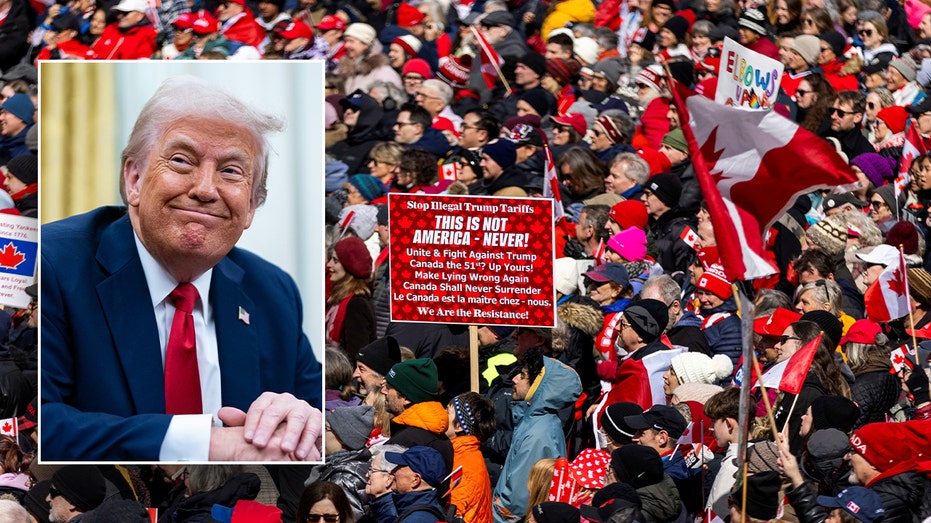Canada Stares Down Consequences of Trump's Tariff War: Job Losses, Grocery Price Hikes, Possible Recession

Sarah Johnson
April 4, 2025
Brief
Canada faces economic turmoil as Trump’s new tariffs threaten jobs, raise grocery prices, and risk recession, sparking a tense trade standoff between the two nations.
Canada is gearing up for a bumpy ride as it confronts the repercussions of President Donald Trump's escalating trade war. Economists are ringing alarm bells over potential spikes in grocery prices, significant job losses, and even the specter of a recession, should the proposed U.S. tariffs come into play.
The United States, which serves as Canada’s major trading partner, accounts for nearly two-thirds of Canadian imports while absorbing over 70% of its exports. But Trump’s newly minted tariffs – 25% on Canadian goods and 10% on energy – threaten to upend that relationship, leaving Ottawa scrambling to mitigate what could be an economic gut punch ahead of its national election campaign.
Trump has justified these sweeping tariffs by lambasting Canada’s trade practices as "unfair" and pointing to a perceived imbalance in trade. His rhetoric, as always, packs a punch: "This is the beginning of liberation day in America," he declared recently, promising to hold countries accountable for "taking our jobs, wealth, and a lot of things." Liberation day? Sounds more like economic Armageddon for Canada.
The fallout isn’t limited to Canada alone. Americans could soon find themselves paying higher prices on goods like fertilizer, oil, vehicles, machinery, plastic, and wood products. This could discourage purchases and indirectly dent Canada’s economy. Talk about a lose-lose situation!
Canada hasn’t taken this lying down, implementing reciprocal tariffs on $30 billion worth of U.S. goods. But it’s a double-edged sword – Canadians are feeling the pinch at grocery stores with soaring prices on essentials like leafy greens, citrus fruits, orange juice, beef, pork, and fish. Ottawa has been cautious about extending these tariffs to U.S. vehicles, given the potential economic fallout.
Andrew Hale, a trade policy analyst, pointed out the delicate political tightrope Canadian leaders must walk during their election campaign. "Tough enough on Trump to appeal to voters, but measured enough to leave room for future negotiations." Not exactly the easiest balance to strike when the stakes are this high.
The toll of this tariff battle is staggering. Immigration Minister Marc Miller has warned that up to 1 million Canadian jobs are at risk. Quebec could lose 160,000 jobs, while Ontario faces a potential blow to 500,000 workers. And let’s not forget that these provinces rely heavily on industries like steel, aluminum, lumber, and forestry – sectors directly in the crosshairs of Trump’s tariff rampage.
A recession could be looming for Canada, according to warnings from Oxford Economists. Previous tariff wars during Trump’s first administration already cost billions globally, and this round seems poised to follow suit. But Trump appears confident that the U.S. will weather the storm better than nations like Canada. Optimistic or delusional? Time will tell.
Adding to the uncertainty, Trump has his sights set on other trading partners, promising to target the so-called "Dirty 15" nations he accuses of bloating the U.S. trade deficit. The April 2 deadline for his tariff announcements has left businesses and banks scrambling for clarity amidst this economic chaos.
"Businesses want certainty," Hale emphasized. "They can’t make future investment decisions in this climate." With inflation stubbornly high and consumer spending slowing sharply in both the U.S. and Canada, the economic outlook is anything but sunny. Here’s hoping that after Tuesday’s announcements, we’ll at least know where this rollercoaster of a trade war is headed.
Topics
Editor's Comments
Trump calling this 'liberation day' while millions of Canadians brace for job losses and soaring grocery prices is peak irony. Sure, it might liberate the U.S. economy from some trade dependencies, but it feels more like everyone loses here – especially the average consumer on both sides of the border.
Like this article? Share it with your friends!
If you find this article interesting, feel free to share it with your friends!
Thank you for your support! Sharing is the greatest encouragement for us.
